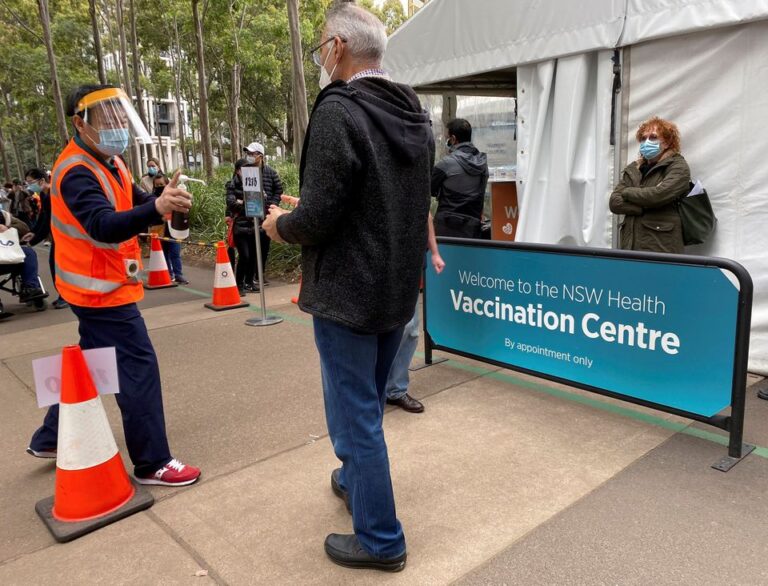
SYDNEY, (Reuters) – Australia’s largest state of New South Wales on Friday urged the federal government to divert vaccine doses to Sydney, the epicentre of a flaring COVID-19 outbreak, raising objections from other states desperate for protection from the virus.
Australia is battling a supply shortfall of the Pfizer-BioNtech vaccine as its COVID-19 inoculation strategy had focussed on AstraZeneca which was subsequently deemed unsafe for those under 60 years by the country’s drug regulator.
That health order resulted in a glut of AstraZeneca vaccines, which many Australians are uncomfortable to take, and sparked a scramble for Pfizer which was in shortsupply as the government had only ordered 10 million doses for the country of 26 million.
As a result, only 15% of Australia’s adult population is fully vaccinated, lagging the COVID-19 inoculation rate in other rich nations.
Now, with Sydney ailing from a relentless surge in the Delta variant of coronavirus despite weeks of lockdown, NSW Premier Gladys Berejiklian on Friday branded the situation a “national emergency”, signalling vaccination as the only solution to “our freedoms.”
The Sydney outbreak has ballooned to nearly 1,800 cases since mid-June.
“We know that in some places around Australia there are very few cases or zero cases,” Berejiklian said in a televised news briefing. “We need to get at least the first jab for as many people as we can in those affected communities as possible, and that’s why we are asking for a refocus of the national vaccination strategy.”
The comment did not go down very well with other states who are unwilling to spare Pfizer doses.
“We need to be very careful when having a discussion about who we prioritise,” Victoria Premier Dan Andrews said.
Victoria, which is in a lockdown until next Tuesday, reported 14 cases on Friday, mostly in Melbourne.
“The fact of the matter is, we don’t have enough vaccine for everyone and the virus will go to the unvaccinated. This is how it works,” Andrews said.
The premier of South Australia, which is also in lockdown, said he was unwilling to see vaccines earmarked for his state diverted elsewhere.
“I’m not wanting to send any of our vaccination doses anywhere else,” Premier Steven Marshall said.
NSW’s desperation for more shots amidst a national shortage of Pfizer vaccines was on the agenda for a national cabinet meeting on Friday.
Prime Minister Scott Morrison has found himself in hot water over the slow vaccination rollout with recurrent outbreaks and lockdowns in major cities clouding the outlook for the country’s $1.5 trillion economy.
Morrison has said he will go to the poll in the first half of next year, but his approval ratings fell to 51%, the lowest level in more than a year, according to a poll published this week.
“Elections are won and lost in the outer metropolitan areas of Sydney, the very areas deemed most in need of the vaccines,” said Haydon Manning, a political science professor at Flinders University in South Australia.
“Whatever decision the government takes on vaccine allocations, it will be very difficult for Morrison to escape blame. The buck stops with him.”






